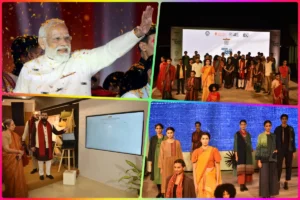
As mandated by the court, the Archaeological Survey of India (ASI) is currently conducting excavations at the Bhojshala/Kamal Maula mosque complex of the Dhar district of Madhya Pradesh.
The ongoing survey, which commenced on March 22 and is now on its ninth day, has been relentless, employing modern scientific techniques such as Ground Penetrating Radar (GPR), Global Positioning System (GPS), and carbon dating, alongside traditional excavation methods. The ASI is meticulously preserving the soil and stones unearthed during the operation.
Ashish Goyal, representing the Hindu community and accompanying the ASI team, highlighted the use of advanced methodologies in the survey process. He emphasized the rich historical significance of Bhojshala, attributing its construction to Raja Bhoj.
Goyal expressed optimism regarding the eventual placement of the idol of Maa Vagdevi (Saraswati) within Bhojshala, following its return from London.
He further disclosed that in the survey conducted thus far, areas on the periphery of Bhojshala have been excavated, with ongoing preservation efforts for materials excavated, such as soil and stones.
Also read: PM Modi to Begin BJP’s Lok Sabha Election Campaign in Uttar Pradesh from Meerut Tomorrow
The court’s directive for the ASI to conduct a survey stems from a petition filed by the Hindu Front of Justice, focusing on a designated area of 50 meters within the complex. Friday’s survey concluded at noon, respecting the time allocated for Muslim prayers within the structure.
The contested nature of the complex is evident, with both Hindu and Muslim communities laying claim to it: Hindus revere Bhojshala as a temple dedicated to Vagdevi (Goddess Saraswati), while Muslims refer to it as Kamal Maula Mosque.
Per an ASI order from April 7, 2003, Hindus are permitted to worship inside the Bhojshala complex every Tuesday, while Muslims are granted access to Friday prayers. The Indore bench of the High Court issued directives on March 11, instructing the ASI to conduct a thorough scientific survey of the medieval-era complex and submit an updated report within six weeks.
The historical significance of Bhojshala dates back to the reign of Raja Bhoj, who purportedly installed the statue of Vagdevi within the complex in 1034 AD. Hindu groups allege that the statue was removed by the British to London in 1875, further adding to the complex’s historical intrigue.
To read more such news, download Bharat Express news apps





















